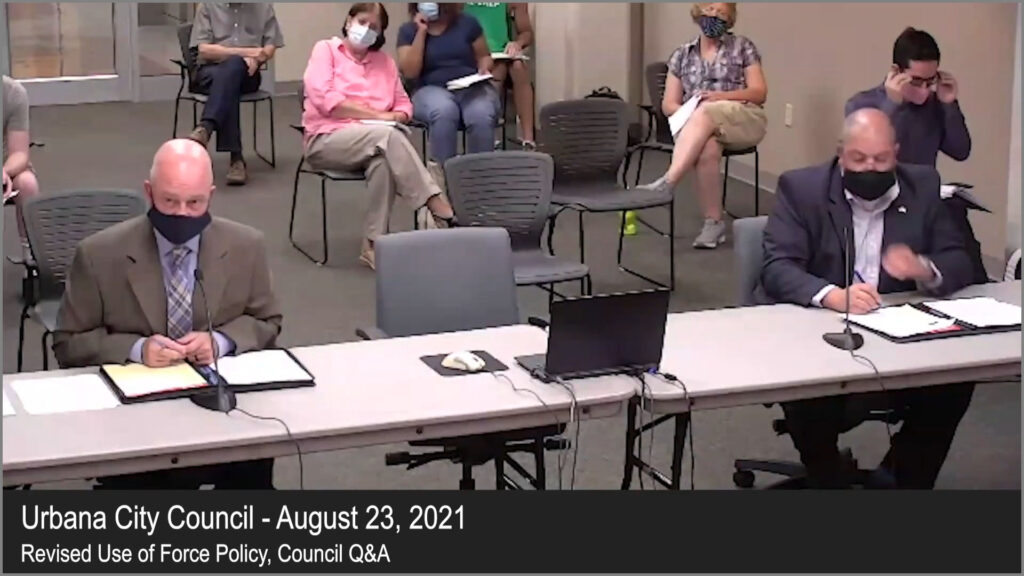
On August 23rd the Urbana City Council heard a presentation from Chief of Police Bryant Seraphin and his Deputy Chief Richard Surles. The presentation was meant to detail the Urbana Police Department (UPD) revised Use of Force Policy, but both the written policy and the presentation fell short on specifics.
Chief Seraphin said the Use of Force Policy, originally 7 pages, had doubled in length. However, as Check CU illustrated in an article published before the Use of Force presentation, UPD only appears focused on Policy 300, which is essentially a use of force overview. Police leadership and the City Council seem unwilling to recognize that of the nearly 600 page long policies book, numerous sections discuss the use of force. Just some of the other sections that cover use of force, in addition to Policy 300, are:
- 301 – Use of Force Review Boards
- 302 – Handcuffing and Restraints
- 303 – Control Devices and Techniques
- 304 – TASER
- 305 – Serious Uses of Force and In-Custody Deaths
- 306 – Firearms
- 308 – Vehicle Pursuits
- 310 – Canines
- 311 – Domestic Violence
- 312 – Workplace Violence
- 313 – Search and Seizure
- 314 – Temporary Custody of Juveniles
- 1028 – Line-of-Duty Deaths or Serious Injuries
Breadth may actually be the lesser of the problems cited by proponents of police reform. As numerous residents have argued over the past 16 months since the violent arrest of Urbana resident Aleyah Lewis, police policies are often written with slippery wording that can be construed to excuse almost any act by a police officer, and there are almost never measures for accountability.
As the Council discussed the revised Use of Force Policy last week, it became clear that the new policy still extended plenty of leeway for officers to justify a wide range of potentially violent and dangerous actions. Regarding accountability, Chief Seraphin freely said that he did not want to discuss any specific mechanisms for discipline (such as a sequence of repercussions), which he indicated might make things too procedurally strict.
On June 1st last year, thousands of people marched past the Urbana City Building demanding changes to policing to eliminate violent interactions like the Lewis incident. Even Mayor Diane Marlin, who participated in the same march but also spent a year fiercely resisting any notions of problems with local policing, would later admit during her reelection campaign that the Lewis arrest was “shocking” and that she wished it hadn’t happened.
Since the recent push for police reform in Urbana was activated by the Aleyah Lewis arrest (and boosted by the murder of George Floyd, of course), it would stand to reason that Urbana’s new Use of Force Policy should, at a minimum, prevent a recurrence of such violent arrest, or at least hold the officers accountable for escalating and using excessive force. Mayor Marlin alluded to that exact conclusion in an interview during her reelection campaign last year.
Council member Grace Wilken, who in April’s election soundly defeated incumbent, Parkland police chief, and Marlin appointee William Colbrook, cut directly to the point. Wilken asked Chief Seraphin how the revised Use of Force Policy would have applied to the Lewis arrest. Seraphin, however, refused to answer, claiming that his legal counsel had advised him not to discuss the Lewis arrest (even hypothetically, it seems). Video of the interaction can be seen below:
It is difficult to untangle the meaning of Seraphin’s refusal. The City of Urbana, and Chief Seraphin himself, have already engaged in countless hours of commentary on that very incident. Seraphin gave a presentation about that incident on April 27, 2020 which was several hours in length. Another lengthy presentation was given on September 8, 2020 by Hillard Heintze firm, whom Mayor Marlin paid in excess of $20,000. The Mayor herself has commented on the Lewis arrest dozens of times on numerous occasions over the past year.
Since Lewis eventually pled guilty to resisting arrest, most legal causes of action she may have had to sue the City of Urbana have been forfeit, so there would not appear to be a legal liability concern at hand.
The City Council approves the appointments of Police Chief and City Attorney, so it is rather bizarre that those appointees appear to be refusing information to the same elected officials. Seraphin’s refusal to answer would also seem to show disregard for the 10 Shared Principles, which the Urbana Police Department adopted on September 17, 2020, and which affirms the tenets of transparency, collaboration, and honest recognition of past and present obstacles.
Unfortunately for Urbana residents and their elected officials, it seems the one question about Seraphin’s revised Use of Force Policy which would prove most instructive, will go unanswered.
